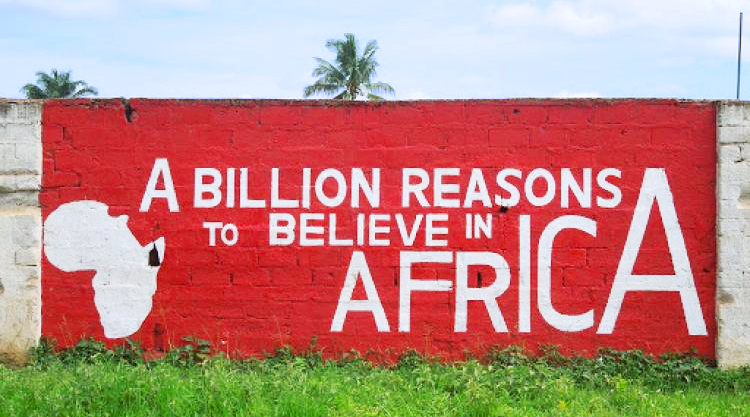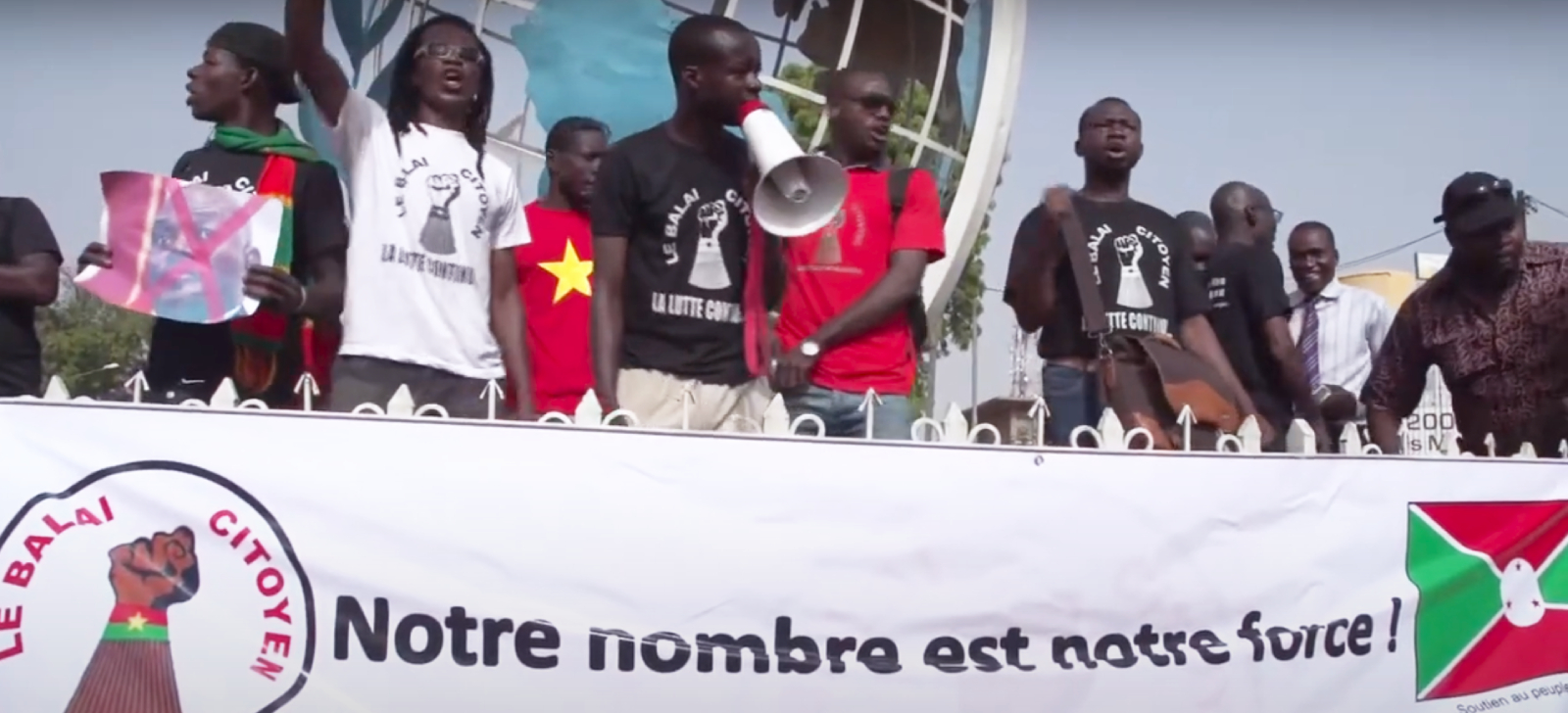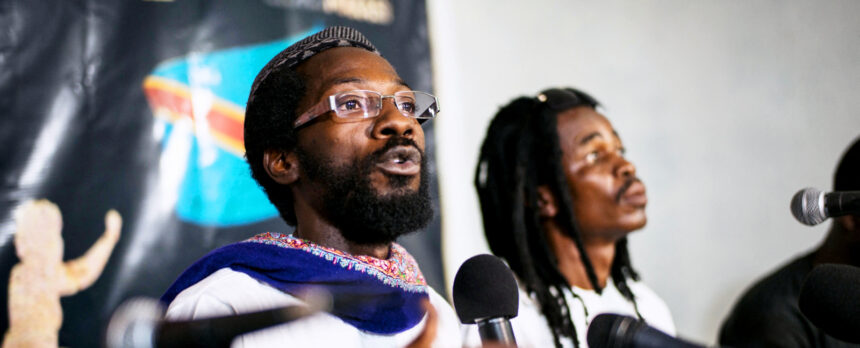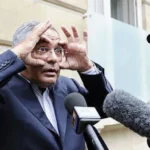The Pan-African movement marks its 105th anniversary in 2024. For decades, Pan-Africanist dialogue in Africa, the Caribbean, and the Americas championed the intellectual foundation to advance decolonization and lay out the principles of peace, democracy, and human rights to guide the newly independent African societies on the continent.
The Organization of African Unity (OAU), founded in 1963, and its successor the African Union (AU) are products of the Pan-African movement. So, too, is the shift to democratic and inclusive governance and popular constitution making that swept through Africa from the 1990s to the 2010s.
Authentic Pan-Africanism stands for people’s democracy and connects their struggles across borders.
Yet, today, opposition parties, the media, and independent thought are often violently suppressed in many parts of Africa, leading to a shrinking intellectual space for critical thinking and dialogue. Many opposition parties are blocked from even campaigning, and there has been a resurgence of fraudulent elections on the continent. Only five African countries are rated “free” in Freedom House’s annual survey of political rights and civil liberties. Nineteen are ranked “partly free” and the rest “not free.” Such rankings track closely with those of the Ibrahim Index of African Governance, an African governance barometer that has been published since 2007.
This repression of independent African thought leaders echoes a mistrust that has persisted between post-colonial governments and “the Academy,” including over freedom of expression, participatory democracy, and human and people’s rights. Students, intellectuals, scholars, poets, and literary critics have regularly been among the most targeted and incarcerated groups in Africa.
The enduring struggle for freedom, justice, and democracy in Africa today is part of an ongoing debate and larger question over who represents African agency and whose interests governments are meant to serve—heads of states or citizens. It also provokes the challenge of how the continent’s long legacy of Pan-Africanism can be employed to the current reality of democratic backsliding gripping the continent.
A Storied Intellectual Legacy for Freedom
Pan-Africanist thought conceives of democracy and human rights as a bottom-up struggle where people exert agency, hold their leaders accountable, and reform governance structures so that they serve citizen interests. Pan-Africanism rejects the idea that human rights are dispensed from the top by governments, but rather calls on citizens to exercise constant vigilance. These African expressions of human rights and democracy are codified in the 1976 Universal Declaration of the Rights of Peoples (the Algiers Charter).
African scholars and intellectuals comprising the Pan-African movement undertook lifelong campaigns to the causes of decolonizing academic departments and retooling them into centers of independent thought that provided the intellectual architecture for democratization.

A Pan-African sign in Tanzania.
These Pan-Africanist ideals subsequently shaped continental governance norms and institutions. The OAU was a compromise between two dominant strands of the Pan-African movement. The Casablanca group favored a “borderless Africa,” deep integration, and a united federation of African states immediately, with common organs like a single African army. Meanwhile, the Monrovia group wanted a looser alliance of gradual economic cooperation centered on the nation-state.
The latter vision prevailed and formed the basis of the OAU/AU in its current form. However, the visions of the Casablanca group remain a rallying credo for Pan-Africanists. They live on in the AU’s “Agenda 2063” that envisions a federation of African states by the 2060s and the AU decision in 2008 to establish the diaspora as the Union’s sixth region. This enables Pan-Africanists from the Americas, Caribbean, and other regions to participate in the AU’s structures and decision-making.
African Prison Intellectuals
The process has often been bumpy, however. The newly independent African states reproduced, with minor changes, the oppressive machinery of the colonial regimes, along with their undemocratic practices. Indeed, Pan-Africanist intellectuals, students, university professors, and social commentators soon found themselves at odds with ruling elites as authoritarian practices crept in.
Newly independent African states reproduced, with minor changes, the oppressive machinery of the colonial regimes.
This resulted in imprisonment and exile, perhaps best captured by the term “African Prison Intellectuals,” which emerged as a distinct tradition within African political thought.
During the early post-independence decades, hundreds of intellectuals, writers, and activists were languishing in exile, including celebrated thinkers like Nawal El Saadawi (Egypt), Ken Saro-Wiwa (Nigeria), Micere Githae Mugo and Ngũgĩ wa Thiong’o (Kenya), Francis Ibingira (Uganda), Bessie Head and Dennis Brutus (South Africa), David Rubadiri, (Malawi), and Ama Ata Aidoo (Ghana). This disillusionment with the repressiveness of African independence leaders likewise complicated relations with noted global Pan-Africanists and allies like Amy Ashwood Garvey, Harry Belafonte, Walter Rodney, James Baldwin, Carole Boyce Davies, and Dr. Martin Luther King, Jr., to name just a few.
Micere Githae Mugo and Ama Ata Aidoo, who both passed in 2023, are emblematic of leading Pan-Africanist scholars who experienced torture, imprisonment, and exile. They found refuge in newly independent Zimbabwe where they worked together. Micere Mugo only regained her Kenyan citizenship in 2010, meaning she was either stateless or a citizen of other countries, most of her adult life. All her literary works, essays, and writings had been banned in her mother country until the past decade.
Because she could not be cited or quoted, Kenyans were also unaware of her immense contributions to decolonization in southern Africa, democratization in Kenya, and the civil rights movement in the United States. A similar fate befell most of her contemporaries.
Both women theorized that national liberation does not end with formal independence. Liberation, they said, is a continuous process of empowering people to understand and transform the structures of oppressive government and build democracy on a new basis with citizen agency and vigilance at its core. Their works focused on reclaiming spaces for intellectual and popular thought, reimagining concepts of freedom, and teaching citizens to become agents of their own self-determination through democracy and vigilance.
Liberation is a continuous process of empowering people to understand and transform the structures of oppressive government and build democracy on a new basis with citizen agency and vigilance at its core.
Such visions of a broader people-oriented Pan-African movement were gradually institutionalized. Some of Africa’s most important projects in democracy—such as the Sovereign National Conferences in Benin, Chad, Comoros, Congo, Gabon, Mali, Niger, Togo, and Zaire (now the Democratic Republic of the Congo) between 1991 and 1993—trace their intellectual roots to the spaces of learning that a long line of thought leaders established in places like the universities of Algiers, Tunis, Cairo, Dakar, Accra, Dar es Salaam, Kinshasa, Ibadan, Nairobi, and Harare, to name just a few.
The University of Nairobi—especially the Faculty of Arts, which Micere Mugo once led as Africa’s first non-white university dean—nurtured Kenya’s democracy movement during the tortuous transition from 30 years of dictatorial rule by the Kenya Africa National Union (KANU). This came at a high cost, however, with university students and professors regularly detained, exiled, or killed, especially between 1991, when the struggle for multiparty democracy took off, until 2001, when KANU was voted out of power by a landslide.
Co-option, Intimidation, and the Muzzling of Free Thought
Sadly, the Pan-African ideals of citizen engagement, upholding multipartyism, and accountability of public officials to citizens have suffered setbacks in the past decade. Notions of citizen agency and democracy as a bottom-up process have at times been regarded as subversive.
“Pan-Africanism was kidnapped,” says Nanjala Nyabola, a leading Kenyan author. “Calls to unity were used to justify state violence and repression, to animate calls for blind loyalty to the state.” Nyabola was referring to the ruling elite in many African countries who use the mantle of Pan-Africanism to legitimize oppressive government. “Books and all forms of writing have always been objects of terror to those who seek to suppress truth,” says Nigerian Pan-Africanist, Nobel Laureate, and former prisoner Wole Soyinka.
Regarding national universities as hotbeds of subversion, governments have sought to control them by restricting the formation of academic unions, removing security of tenure for professors, planting informers, and promoting regime-friendly academics. In many countries, the head of state also held the official position of Chancellor of their national university, a colonial relic designed to bring academic institutions in line with state policy.
Such measures continue in different forms throughout much of Africa today, where relationships between public and private university departments and governments remain tense and fraught with suspicion.
Core Ideals
Pan-Africanism emphasizes popular sovereignty, including the responsibility to protect, the principle of “non-indifference,” and global solidarity.
Pan-Africanism views democracy as an ongoing process in which citizens collectively participate in transforming governance institutions. Democracy in this sense goes beyond elections and multiparty politics to define a way of life. Secondly, Pan-Africanism does not equate statehood with freedom, as many states violate their citizens’ rights under the cover of national sovereignty. Pan-Africanism, instead, emphasizes popular sovereignty, including the responsibility to protect, the principle of “non-indifference,” and global solidarity. Lastly, Pan-Africanism encourages people to embrace other struggles for freedom as their own and stand ready to help.
According to Micere Mugo, “I am a border crosser, defying geographical containment. I am Zimbabwean, I am African, I am Pan-African, I am Nigerian, I am Jamaican, I am an internationalist, I am a Black American, I am trans-nationalist. I am a citizen of the world.” Such views live on in Pan-Africanist coalitions like Senegal’s “Y’en a Marre,” Burkina Faso’s “Balai Citoyen,” and “Filimbi” and “La Lucha” in the Democratic Republic of the Congo (DRC)—all part of a growing trend of young people reinventing Pan-Africanism and embracing democratic struggles in other countries.
In 2015, Y’en a Marre and Balai Citoyen activists converged in the DRC to work with Congolese civil society to develop a strategy of resistance when it became clear that Joseph Kabila would ignore the constitution and cling to power. Some even participated in nationwide protests and ended up in prison.
That same year, Balai Citoyen members shared tactics with Burundian civil society, enabling them to sustain daily protests for 3 months over President Pierre Nkurunziza’s claim to a third term. Back home in Ouagadougou, they organized regular “solidarity protests” on behalf of Burundian protestors. The theme of these solidarity protests was “Je suis Burundais” (I am Burundian). In Zimbabwe, civic movements have benefited from several decades of solidarity work from southern African civic organizations.

Burkina Faso citizens express solidarity with Burundians protesting Pierre Nkurunziza’s unconstitutional third term. (Image: screen capture)
At a solidarity dinner of the Zimbabwe Human Rights Association (ZimRights) on the sidelines of the 77th session of the African Commission on Human and Peoples’ Rights (ACHPR) in Tanzania in October 2023, continental human rights coalitions pledged to step up their engagement with the Zimbabwe crisis and “learn from the founding fathers of the AU on the importance of giving solidarity to each other.” The 1,000-member Pan-African Lawyers Union and the Pan-African Human Rights Defenders Network were among the coalitions at the meeting.
Pan-African Democratic Ideals at the African Union and RECs
Pan-Africanism has helped create institutions and shape norms within the regional economic communities (RECs) and the AU itself. The Southern African Political Economy Series (SAPES) Trust, one of the oldest affiliates of the Pan-African Congress (PAC), helped draft the Southern African Development Community (SADC) Principles and Guidelines Governing Democratic Elections and the SADC Electoral Advisory Council that aims to prevent and deter election-related conflict and electoral fraud. The East African Civil Society Organizations Forum (EASCOF), a Pan-African organization that facilitates civil society engagement with the East African Community (EAC), has been part of a larger push by civic organizations to put the establishment of an East African Federation on the EAC’s agenda.
In 2023, the ACHPR agreed to appoint an independent Focal Point on Judicial Independence in Africa to monitor, track, and report on threats to judicial independence among the AU’s 54 member states. That decision was the outcome of sustained and coordinated lobbying and engagement by four Pan-African initiatives: the Pan-African Lawyers Union, the African Judges and Jurists Forum, Southern Defenders, and African Defenders.
Young professionals are anchoring Africa’s contemporary democratic struggles firmly within the intellectual foundations of Pan-Africanism.
Young professionals are anchoring Africa’s contemporary democratic struggles firmly within the intellectual foundations of Pan-Africanism. Afrobarometer’s latest survey finds that nearly 70 percent of Africans prefer democracy to any other system. More than three-quarters reject military rule, one-party rule, or one-man rule. Notably, citizens aged 18-30 show a stronger commitment to democracy. Yet, they face ongoing resistance from those who would usurp citizen agency and attempt to present fraudulent elections as democracy. Only 43 percent of African citizens, accordingly, are satisfied with the way democracy works in their country.
This might explain why young people appear to be increasingly attracted to the idea of redefining Pan-Africanism as a mobilizing tool for democratic and nonviolent resistance and narrative-building. Hundreds of democracy-minded Pan-African youth groups have formed in recent years alongside the steady uptick of good governance protests in the past decade. Some like the Pan-African Network, the Pan-African Movement Reborn, Being Pan-African, and the Center for Pan-African Culture have thousands of members.
Professor Achille Mbembe, Africa’s first Holberg Prize laureate, is another contemporary model of public intellectual championing Pan-Africanism. A Cameroonian-born academic at the University of Witwatersrand, Mbembe leads the Innovation for Democracy Foundation—a Pan-African organization promoting research and the production of new thinking on democracy in Africa.
Revitalizing the Ideals of Pan-Africanism
Pro-democracy grassroots organizations are increasingly challenging the appropriation of Pan-Africanism by ruling authorities who use it to protect themselves and their fellow incumbents and isolate people’s movements as “imperialist agents. Authentic Pan-Africanism stands for people’s democracy and connects their struggles across borders. In the process it forges a common identity and shared experience that rise above the strictures of the state.
Notably, social movements, grassroots coalitions, and professional associations view their democratic struggles as interlinked and have made solidarity and mutual support central to their work. This is critical in order to show that repression of voices in one country will not be met by silence or inaction elsewhere. Simultaneously, civic coalitions and professional coalitions continue to push for softer borders, deeper integration, common institutions, and inclusion of the African diaspora in the AU’s decision-making.
“The human rights [and democracy] struggle is a liberation struggle … the same struggle that our forebearers waged against colonialism.”
Centers of learning—particularly state and private universities—can play their part by reclaiming their historical role in generating ideas to guide popular struggles for democracy. There is also a need to learn from history to strengthen safeguards to protect reform movements, spaces for intellectual thought and learning, and those who speak truth to power.
Pan-Africanism is developing as a central credo of such efforts. As Dzikamai Bere, the Director of ZimRights explains, “The human rights [and democracy] struggle is a liberation struggle meant to fulfil the promise of the liberation. The fact that we choose to wage it without violence does not make it less important. It is the same struggle that our forebearers waged against colonialism.”



